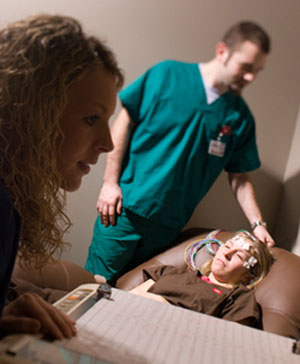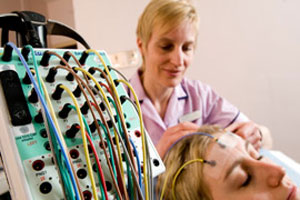Neurophysiology Technologist
Tasks & duties

Neurophysiology technologists may do some or all of the following:
-
talk to clients about neurophysiology procedures
-
position clients and apply electrodes to record brain and nerve activity
-
record brain activity using the electroencephalograph (EEG) machine (which creates a computer picture of the electrical activity of the brain)
-
record nerve activity by testing the nervous system response to sound, touch and light
-
observe clients' brain and nerve activity and responses
-
analyse and interpret clients' test results, and assist neurologists and neurophysiologists with more detailed analysis
-
carry out other specialised tests on the nervous system
Senior neurophysiology technologists may help in research or experimental work on the brain and nervous system. They may also record brain activity during surgery, and monitor patients in a sleep laboratory to evaluate sleep disorders.
Specialisations
Neurophysiology technologists in large hospitals may also conduct electroencephalograph (EEG) tests in more specialised areas, which can include:
-
neurosurgery (monitoring the brain during surgery)
-
evoked response tests and nerve conduction studies
-
testing for muscle and nerve disorders using the electromyography (EMG) machine
-
monitoring patients in a sleep laboratory to evaluate sleep disorders
Skills & knowledge

Neurophysiology technologists need to have:
-
knowledge of the functions of the nervous system and related medical terms
-
knowledge of electronics, physics and physiology
-
understanding of neurophysiology methods and techniques
-
skill operating the electroencephalograph (EEG) and electromyography (EMG) machines and the ability to interpret the information they produce
-
knowledge of different medical emergency procedures
-
knowledge of diseases of the brain and nervous system, and their treatment
-
good communication and people skills
-
good technical and computer skills
-
record-keeping skills
Entry requirements
To become a neurophysiology technologist it is preferred that you have a Bachelor of Science or a general degree in health sciences.
Secondary education
Bursary or NCEA-equivalent is needed to enter tertiary training. Useful subjects include physics, biology and English.
Training on the job
Hospitals usually train neurophysiology technologists on the job. While training, neurophysiology technologists can do distance learning and obtain a Certificate in Neurophysiology Technology.
Royal Melbourne Institute of Technology website - information on Diploma of Neurophysiology
Useful experience
Useful experience for neurophysiology technologists includes:
-
scientific work
-
nursing, work in a rest home, or any other client care-related work
-
other hospital or health sector work
-
computer or electronic work
Related courses
General Medicine
Human Biology
Neuroscience
For more information, please refer to Career Services.
Document Actions
